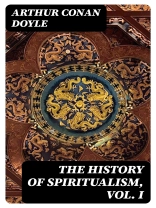In ‘The History of Spiritualism, Vol. I, ‘ Arthur Conan Doyle embarks on an exploration of the spiritualist movement that gained momentum in the late 19th century, a period marked by fascination with the supernatural and the quest for understanding beyond the physical realm. The book artfully combines anecdotal narratives, historical context, and philosophical musings, employing a straightforward yet engaging literary style that reflects Doyle’s characteristic clarity. As the first volume in a two-part series, it serves to illuminate the underlying principles of spiritualism, key figures, and notable events that shaped this controversial movement, presenting both proponents’ and skeptics’ views with intellectual rigor and an empathetic approach. Arthur Conan Doyle, renowned for creating the iconic detective Sherlock Holmes, was deeply influenced by the tragic loss of loved ones and his own experiences with the spiritualist phenomena. His foray into this realm is not mere curiosity; it is a profound search for solace and understanding, driven by the personal grief that often colors the narrative. Doyle’s unique position as a literary figure lends credibility and allure to his examination of spiritualism, as he weaves his own insights into the broader historical tapestry. This work is indispensable for those drawn to the intersections of literature, philosophy, and the esoteric. Readers who seek to understand the cultural significance of the spiritualist movement and its impact on the Victorian psyche will find Doyle’s meticulous research and compassionate prose illuminating. ‘The History of Spiritualism, Vol. I’ promises a thought-provoking journey into a compelling chapter of humanity’s quest for meaning.
Over de auteur
Sir Arthur Conan Doyle (1859-1930), a Scottish writer and physician, is best remembered for creating the iconic detective Sherlock Holmes. However, his literary pursuits extended beyond deduction and mystery. A testament to his diverse interests is ‘The History of Spiritualism, Vol. I, ‘ which chronicles the movement’s evolution and key figures. Educated at Edinburgh University, Doyle practiced medicine before transitioning to writing. Influenced by his beliefs, he became a vocal proponent of spiritualism, an aspect of his life explored in his historical work. Known for a clear, concise style, Doyle’s non-fiction is marked by the same meticulous research seen in his fiction. He was knighted in 1902, not for his literary achievements, but for his services during the Boer War. Despite the fame of Holmes, Doyle’s spiritualist writings afford insightful glimpses into the era’s social and intellectual climate, cementing his status as a versatile writer within Victorian and Edwardian literature.












